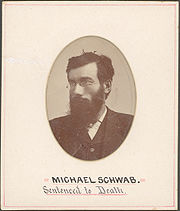
Michael Schwab
Encyclopedia

Early years
Schwab was born in Bad Kissingen, FranconiaFranconia
Franconia is a region of Germany comprising the northern parts of the modern state of Bavaria, a small part of southern Thuringia, and a region in northeastern Baden-Württemberg called Tauberfranken...
in Germany
Germany
Germany , officially the Federal Republic of Germany , is a federal parliamentary republic in Europe. The country consists of 16 states while the capital and largest city is Berlin. Germany covers an area of 357,021 km2 and has a largely temperate seasonal climate...
and was, by trade work, a bookbinder. He emigrated to the United States in 1879 and lived variously in Chicago
Chicago
Chicago is the largest city in the US state of Illinois. With nearly 2.7 million residents, it is the most populous city in the Midwestern United States and the third most populous in the US, after New York City and Los Angeles...
, Milwaukee and the Western U.S. before settling permanently in Chicago in 1881.
Activism
Schwab became an activist even before emigrating to the United States, having written articles for several radical German newspapers. He joined the German Social Democratic Party in 1872. In the U.S., he became involved in the workers' rights movement, first joining the Socialist Labor Party and later joining the International Working Persons Association and helping to form North-Side Group faction of that organization. He began writing and eventually became co-editor of the Arbeiter-ZeitungArbeiter-Zeitung (Chicago)
The Arbeiter-Zeitung, also known as the Chicagoer Arbeiter-Zeitung, a German language anarchist newspaper, was started in Chicago, Illinois, in 1877 by veterans of the Great Railroad Strike of 1877. It continued publishing through 1931...
, an anarchist newspaper for German immigrant workers. He was very active in the 8-hour day movement.
Haymarket
On the night of May 4th, 1886, Schwab left the office of Arbeiter-Zeitung, and stopped at the Haymarket meeting to look for fellow editor, August Spies. Not finding him, Schwab spoke briefly with his brother-in-law, Rudolph Schnaubelt, who was later accused of being the bombthrower. Schwab contended that he was at the Haymarket for no more than five minutes. He left there to speak at a meeting of workers at the Deering Reaper Works at the corner of Fullerton and Clybourn streets. This is where he remained throughout the bombing and left there to go straight home.Arrest, Trial, Amnesty and Later Years
Schwab was arrested with the other six Haymarket rioters, while Albert ParsonsAlbert Parsons
Albert Richard Parsons was a pioneer American socialist and later anarchist newspaper editor, orator, and labor activist...
turned himself in. In court, he was convicted along with his co-defendants and sentenced to death, while Oscar Neebe
Oscar Neebe
Oscar William Neebe I was an anarchist, labor activist and one of the defendants in the Haymarket bombing trial.-Early life:...
was sentenced to 15 years in prison. Schwab wrote to Illinois governor Richard James Oglesby
Richard James Oglesby
Richard James Oglesby was an Illinois statesman and U.S. Army officer. He served in the Mexican-American War and was a major general in the Union Army during the American Civil War. He also served Illinois in the legislature. Near the end of the civil war, he was elected the 14th Governor of...
for lenience and on November 10, 1887, Oglesby commuted his sentence, along with that of Samuel Fielden
Samuel Fielden
Samuel Fielden was a socialist, anarchist and labor activist who was one of eight convicted in the 1886 Haymarket bombing.-Early life:...
, to life imprisonment. He served six years at Joliet Penitentiary before being pardoned with the other two by Illinois Governor John Peter Altgeld
John Peter Altgeld
John Peter Altgeld was the 20th Governor of the U.S. state of Illinois from 1893 until 1897. He was the first Democratic governor of that state since the 1850s...
on June 26, 1893. After his release, he continued to write for the Arbeiter-Zeitung and opened a shoe store from which he also sold books on labor rights, but his health was poor since leaving prison and the store failed.
Schwab died from respiratory disease contracted while at Joliet on June 29, 1898. He is buried at Waldheim Cemetery
German Waldheim Cemetery
German Waldheim Cemetery, also known as Waldheim Cemetery, was a cemetery in Forest Park, a suburb of Chicago in Cook County, Illinois. It was originally founded in 1873 as a non-religion specific cemetery, where Freemasons, Roma, and German-speaking immigrants to Chicago could be buried without...
along with seven other Haymarket martyrs.
External links
- Chicago History: Michael Schwab
- Address of Michael Schwab The Accused, the accusers: the famous speeches of the eight Chicago anarchists in court when asked if they had anything to say why sentence should not be passed upon them. On October 7th, 8th and 9th, 1886, Chicago, Illinois.
- Reasons for Pardoning Fielden, Neebe and Schwab John P. Altgeld, Governor of Illinois.

